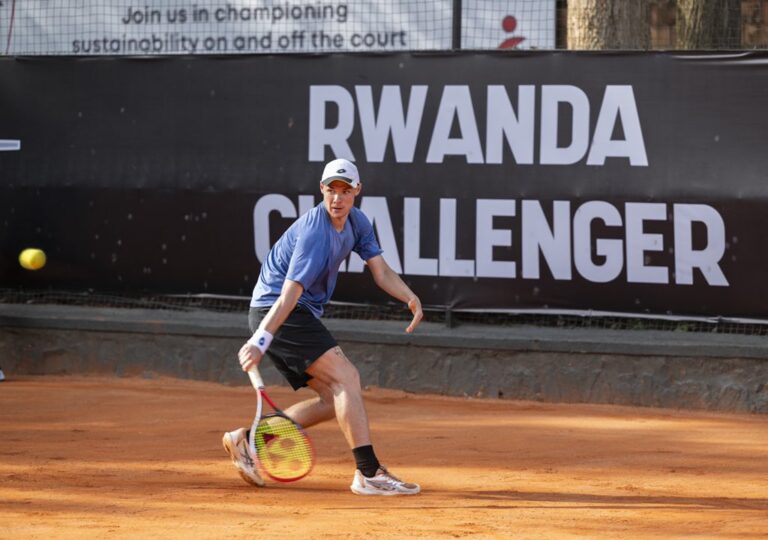
Next month will mark 30 years since the beginning of the Rwanda genocide, an atrocity that claimed more than one million lives, mainly members of the minority Tutsi ethnic group.
As the central African country continues to recover and rebuild, tennis is playing a small but important part of the healing process. Case in point is the ATP Challenger Tour, which this week is holding the second of back-to-back Challenger 50 events in the capital city Kigali.
Rwanda is just the seventh African country to host an ATP Challenger Tour event and tournament director Arzel Mevelle envisions this as a positive stride towards bringing more high-level events to the Central African region.
“Rwanda took a risk to organise the first big tournament in this part of the world,” Mevellec told ATPTour.com. “When you talk about North Africa, it’s something different. In Morocco and Tunisia, they’ve had tournaments for a long time but in this part of Africa, it’s brand new.
“It’s a very important symbol. Rwanda is a small country but with big events now. Soccer, NBA Academy Africa, and now Rwanda is on the world map of tennis and I think that’s the beginning of something huge. Rwanda can be proud about that.”
Rwanda, which boasts a population of nearly 14 million people, joins Morocco, South Africa, Nigeria, Egypt, Tunisia and Nigeria as the only African countries to hold an ATP Challenger Tour event.
Held at the Kicukiro Ecology Tennis Club, the tournament is much more than trophies, PIF ATP Rankings points and prize money. The Rwanda Challenger is also a reflection of the nation’s transformative journey from its traumatic past.
Rather than trying to erase this dark chapter from history, the tournament has adopted an alternative approach: promoting education and honouring the fallen through visits to the Kigali Genocide Memorial.
“More than 20 players registered,” Mevellec said. “We have to explain to them that the country is not the same country as 30 years ago. There are still some cliché about Africa in general and some countries. That’s something very important to understand the country, understand the past situation and understand now. When you are there, it’s something special and another atmosphere. You feel the heaviness of it and I think it’s good for them to feel that.”
When the first leg of two weeks was completed Saturday, with World No. 652 Kamil Majchrzak becoming the lowest-ranked Challenger champion since last July, it was a celebration of a successful maiden event.
Among those in attendance for Saturday’s final were Rwanda President Paul Kagame, first lady Jeannette Kagame and 1983 Roland Garros champion Yannick Noah, who serves as the tournament ambassador.
“I honestly didn’t expect to see such a beautiful tournament, a beautiful event,” Noah said. “It stimulates me and gives me a lot of energy to go back to Cameroon and try to do something that looks like this. My son [former NBA star Joakim Noah] came to Rwanda many times promoting basketball and he talked greatly about Rwanda… I’ll be back.”
Don Rutagemwa, a Rwanda native and assistant tournament director, hopes these two weeks mark the birth of more ATP Challenger Tour events in the region.
“We can’t come this far to have just one tournament,” said Rutagemwa, who is also the secretary general for the Rwanda Tennis Federation. “The dream is to keep growing the tournament. We joked that in the next five years, maybe we can have a Grand Slam. We need to keep the momentum and make it more attractive for the African players who cannot travel to Europe. We want to attract the global talent but also the local players.”
In addition to world-class professionals in action at the Kicukiro Ecology Tennis Club, the Rwanda Challenger is hosting beginners’ clinics for local youth during the tournament.
Aurore Mimosa Munyangaju, Rwanda’s Minister of Sport said: “This ATP Challenger Tour 50 tournament is a milestone event for our country, being the first of this kind in the region. The excitement and energy I have felt throughout the course of the tournament has truly been remarkable.”
Rwanda Challenger 1 champion Kamil Majchrzak said: “This is historical for this country and it’s been amazing. The tournament is organised perfectly. The players were really taken care of and the court quality was also really nice. I think every player feels comfortable here.”
Zimbabwe’s Courtney Lock said: “For the last two-and-a-half years, this is the first Challenger outside of North Africa. It’s a two hour flight for me, probably the closest flight I take all year so I definitely feel as close to home as I can.”
